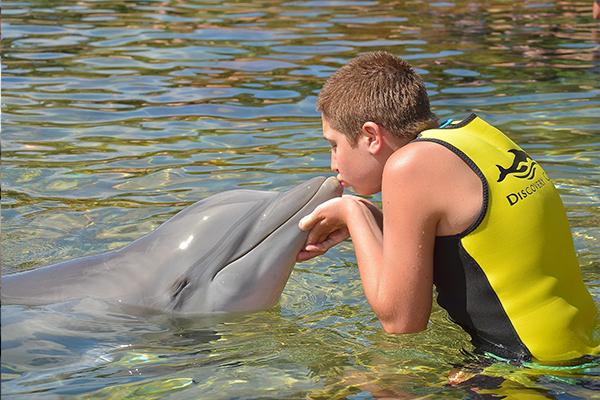Interaction - Swimming with Dolphins

Programs that offer interaction with dolphins, both, the ones promoting physical contact and feeding them, as well as the ones that promote swimming with them either in captivity or in the open sea, are increasing in number and popularity. It is understandable that the public is attracted to approach these animals, however, these activities are alarming for several reasons.
Swimming with captive dolphins
Arguments against the confinement of cetaceans are so over-whelming (see more), that any proposal to keep them captive, for whatever reason, should be rejected on animal welfare grounds alone.
The risks of interaction for both people and animals include: aggression towards people, especially once they have reached sexual maturity; damaging the dolphins' sensitive skin by scratches from rings and other jewelery, or irritation caused by chemical substances found in cosmetic products; potential for disease transmission from human to dolphin or vice versa. Dolphins are large, strong animals, perfectly adapted to the conditions of the open ocean. Held in a confined space and subjected to forced interaction with humans, aggressive behavior can have serious consequences. There are many incidents of aggressive behavior by dolphins towards human visitors such as threats, biting and butting.
Dolphins may be forced to interact with humans without any rest. Many of them are torn away from their natural habitat and transported for thousands of miles to later suffer the effects of their confinement.
For more information FAADA-Delfinarios-Nadar con Delfines
Swimming with wild whales and dolphins
Swimming with wild whales and dolphins is, potentially, an exhilarating and unforgettable experience. Sadly, it is very difficult to ensure that the encounter takes place on the whale or dolphins terms and is not an intrusive or stressful experience for what are, after all, wild animals. For this reason, we cannot recommend public support for commercial swim-with-wild-cetacean programs which have sprung up in various parts of the world in recent years.
Whilst there are responsible and thoughtful swim operators, sadly, it is also true that, in some locations, wild whales or dolphins are harassed and repeatedly disturbed by boats which tend to drop swimmers in the water as close as possible to the animals. Research indicates that, in some areas heavily targeted by commercial swim tours and other human activities, dolphins are actually leaving their traditional habitat in favor of quieter areas. There is concern that disruption to feeding, resting, nursing and other behavior may have a long-term impact on the health and wellbeing of individuals and populations.
Another aspect to consider is the safety of swimmers and cetaceans. Whales and dolphins are large, powerful animals and if not treated with respect, are capable of injuring people in the water, either accidentally, or if they feel threatened in any way. Like all animals, cetaceans are protective of their young. Boat propellers and thoughtless behavior from swimmers can hurt them.
In some areas, cetaceans are offered food by swim tour operators to encourage them to remain in the vicinity of swimmers. This practice may encourage ‘begging behavior’, causing the dolphins to become artificially dependent upon humans and neglect their normal foraging activities.
More information here Whale and Dolphin Conservation Society
